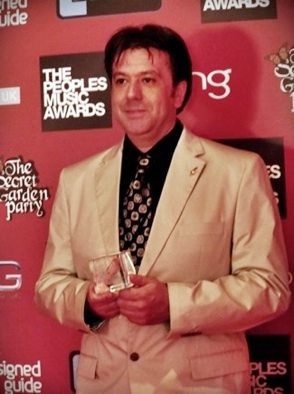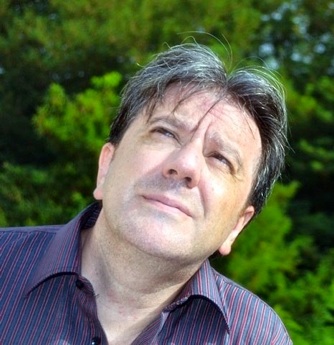One of my favorite things about the internet is that it has made the world so much smaller. As a reviewer, I am now getting music to review from all over the world. One of my favorite international artists is Antonio Simone in Italy. A classically-trained pianist, he has released two albums of original piano compositions, including his recent
Step By Step. I have been thoroughly enjoying getting to know Antonio and his music, and hope this interview will help spread the word and bring him lots of new fans!
KP: Hi Antonio, how are you today?
AS: Hello Kathy, I'm fine, thank you! I've just returned home after spending a couple of weeks at the coast in the company of family and friends. It was great and I enjoyed my vacation very much, but now I'm tired of relaxing... So here I am again, ready to be back in action.
KP: I really enjoyed reviewing your latest album,
Step By Step. How is it doing?
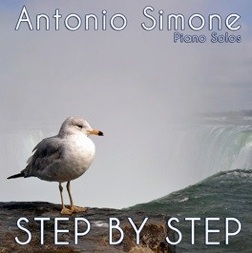
Click the album covers to read Kathy's reviews.
AS: It's doing well, thanks. I'm so encouraged by the most positive responses I have received from individuals all over the world and grateful for the fact that they have taken the trouble to convey their support and delight at this new venture of mine. I think the general impression I am getting from people is the fact that this second album builds on the first and the individual pieces are more complex somehow, allowing listeners to immerse themselves even more in the music. I am really glad that Step By Step is already getting outstanding reviews...
KP: Step By Step was the follow-up to 2010's Life Colours, which was one of my favorite albums that year. Are those your only recordings so far?
AS: If you are referring to official recordings of music which I have composed and performed, the answer is: "Yes!" Some recordings of me performing classical music have been made in the past, but they were not made official, becoming instead priceless items of inheritance, in the possession of both friends and relatives!
KP: Those will become highly sought-after collector's items! Let's talk about your background. Where were you born and where did you grow up?
AS: I was born in Capua, a city located about 25 miles north of Naples, in Italy, which also gave birth to Giuseppe Martucci, one of the greatest Italian musicians who lived in the late nineteenth and early twentieth centuries. After spending a few years of my childhood in a village not far from Capua, I moved to town with my family. Then I took my first steps into the world of music as a classical piano student, while attending regular school.
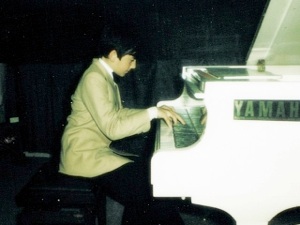
10 years old
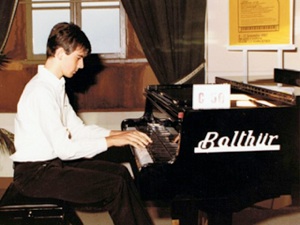
13 years old
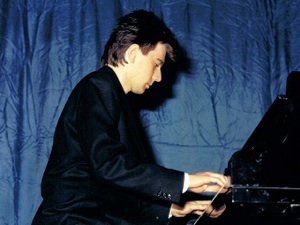
17 years old
KP: Are any other members of your family musicians?
AS: Music has always been present in our household and a number of family members either play instruments or sing with varying competence, but none yet have taken it to a professional level like me.
KP: How old were you when you started playing the piano? When did you start piano lessons, and how long did you take lessons?
AS: I began my musical training at nine years of age. It was after my acclaimed performance as a singer during a school recital (I was about 8 years old) that my parents decided to offer me the chance of learning to play an instrument, and I chose the piano. I began taking private piano lessons and I continued my musical education for ten years until I graduated at the age of 19 and with the highest possible marks, from the Conservatory of Music.
KP: Were you encouraged to improvise or compose by your piano teacher(s) or anyone else?
AS: To a small degree, I think. Basically, my interest in composition and improvisation came fairly spontaneously.
KP: Do you play other instruments besides piano?
AS: No, I don't. I already cause enough trouble with a piano, let alone anything else...
KP: Haha! How old were you when you started improvising?
AS: I started to improvise during my teenage years. To be honest, I don't consider myself to be a great improviser - nothing to write home about, I mean... I much prefer composing and playing what I write.
KP: How old were you when you wrote your first song?
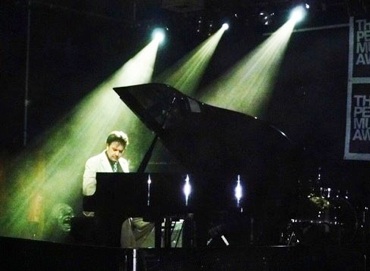
Performing at The People's Music Awards, London 2011.
AS: I don't remember exactly, but I think it happened when I was about ten or eleven years old. I remember well however, that I used white sheets of paper on which I first had to draw staves (using a small ruler) and a pencil with two colours to write musical notes. My first compositions consisted of tunes which were not very long and which I liked to play to whomever came and visited me at home (poor them, having to endure all this...). I now remember that period with great affection.
KP: The people you played for probably also have very fond memories of that time! What kinds of things inspire you to compose?
AS: Mostly life, beauty in all of its forms and expressions, moods and feelings. Sometimes in addition to feeling inspired, it seems the music is being channeled through me from somewhere else, as though I am taking dictation - the melody just flows in a very natural way.
KP: Quite a few other composers have told me that they often feel that they are channeling the music - that it is simply flowing through them. It must be a wonderful experience to have creation happen so effortlessly!
AS: Unfortunately that doesn't happen to me very often, just sometimes, as I said. It is such a magical experience being able to create in this way but almost always I have to put in my own contribution to let the music become real...
KP: I've read that you don't like to explain the specific inspiration for each of your pieces. Why is that?
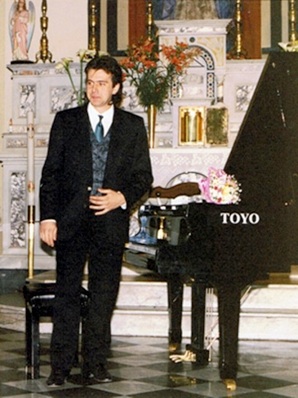
20 years old
AS: Yes, that's true, and I'll explain my thoughts... You know there are many musicians who, during live performances, introduce songs by telling the audience about the story behind the piece. I think this could influence the way people listen to music and cause them to have preconceptions about how they interpret the piece, while conjuring up in their minds certain images, scenarios, situations and feelings in a somewhat "pre-programmed" way. I believe that listening should be unconditional, undertaken with an open mind which is ready to receive and simultaneously process any reactions and subjective feelings, as for example in the same way as you would look at a painting. Everyone then sees something in the work which is quite unique and subjective, going far beyond that objective element which the artist or musician may wish to convey.
KP: I can really see your point. I always enjoy knowing what inspired a piece of music, but without too many clues, each person will form a different and more personal idea of what the music is about for him or her.
AS: Yes, exactly!
KP: I've also read that you were a music therapist for a while. Why did you choose that field?
AS: It happened quite randomly one year. I taught in a school and I had an autistic child as a pupil. It was the first time I had found myself in such a situation and I did not know how to undertake my job as a teacher in the best way. In the absence of any specific experience, I decided to tap into the resource that gave me more security: music. It was almost a miracle to see how, little by little, the door into the world of my student became ever more open, through the power of music...
After this experience I decided to broaden my knowledge of music therapy, attending several courses and master classes, becoming a trainer myself and working on music therapy for over a decade.
KP: When did you leave music therapy?
AS: When I started feeling that I was getting further and further away from the piano and this was beginning to make me feel bad. So I made my decision to leave music therapy because it was too time-consuming as I wanted to pursue my piano playing and composing. I needed to commit myself entirely to music therapy if I were to do it properly and that left no time for my music so, after about ten years, I relinquished being a music therapy trainer and practitioner.
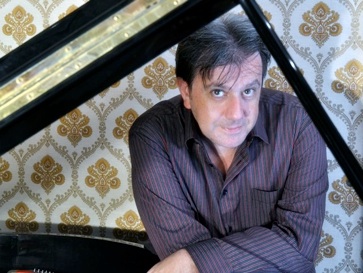
At home, August 2012.
KP: On an entirely different subject, many of the artists I've spoken with seem to think it is even more difficult for independent musicians to have their music heard in Europe than it is in the US. Has that been your experience as well?
AS: I do not think it's a matter of borders or cultures. Being an independent artist is not easy, anywhere in the world. You have to work hard in many aspects ranging from production and promotion to the concerts themselves, etc. and when you don't have people to do all this for you, the task is much harder. I'd be grateful for any help people could give me in promoting my music in the States, Europe, the rest of the world and any nearby planet.
KP: Well, let's see if this interview helps to get the word out! Are you doing music full-time then?
AS: I would like to - you can't imagine how much! But for various reasons, currently I'm not able to be a full-time pianist and composer.
KP: Who or what are your biggest musical influences?
AS: Much of what I play and compose is inevitably influenced by the teachings of the classics: Bach, Mozart, Chopin, etc. On the other hand, when it comes to the New Age genre of music in which I am getting more involved these days, the contemporary musicians that I enjoy listening to include: Andre Gagnon, Yuhki Kuramoto, David Lanz, Ryuichi Sakamoto, Ludovico Einaudi, to name just a few.
KP: Have you done any composing for films and/or TV? Is that something you want to do?
AS: To date, I have not written music specifically for film or television, although I have noticed that often, amongst the comments received from listeners of my music, people have mentioned how very suitable some of my tracks would be as soundtracks. I would certainly not rule out the possibility of me specifically composing music for this genre in the near future or else collaborating with other musicians who are already involved in this field of work.
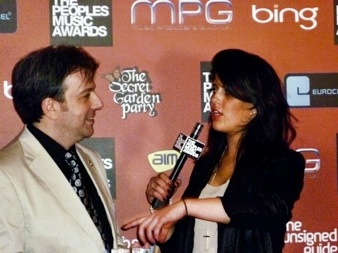
Being interviewed at The People's Music Awards.
KP: What has been your most exciting musical moment or experience so far?
AS: If I look back, from my beginnings in music up to now, I am able to say that there were many exciting moments and it is therefore difficult for me to choose only one. Similarly, there were moments of discouragement and crisis, which have helped me to grow and become more aware and perhaps a little wiser. However, one of the most recent and exciting experiences I recall was my success at The People's Music Awards, in the Folk/Jazz/Classical category, with "Kendra's Song," a piece from my debut album Life Colours. I attended the Awards Ceremony at the Scala in London, during which I also performed my music.
KP: Is there a particular philosophy that you try to convey in your music?
AS: Well, honestly speaking, I don't think I have one. I know I'm one of many, neither better nor worse than others - just different. I tell stories without words, through the universal language of music, for those who have the sensitivity to listen, to feel emotions and experience the need to write something to let me know how they felt while listening to my music. What more could I ask for?
KP: Who are your favorite composers?
AS: I must say it's a really long list, which includes musicians from all eras. In any event, Fryderyk Chopin is certainly at the top of that list.
KP: He's my favorite classical composer, too! Who are your favorite performers?
AS: There are many and they are from different musical genres. When I was a young piano student, I was fascinated each time I heard Arturo Benedetti Michelangeli and Vladimir Horowitz playing on television. In the past I have really loved Art Tatum's artistry on the piano and still do. In the contemporary music scene Pasquale Iannone is my favourite classical musician. As far as other genres are concerned, I very much like Stefano Bollani, Diana Krall and Yanni.
KP: That's a very eclectic list! What's up next for you?
AS: I usually like to say... the best is yet to come! So, with that in mind, I'll find the right energy to start new projects, compose and play new music, whilst undertaking things which will help me to improve, being aware of the certainty in life - as someone said in the past - that you can always improve, letting others think that "they" are the best, if they're convinced of that.
KP: If you could have any three wishes, what would they be?
AS: I'm sorry, but I can confide this only to the genie of the lamp, so that I may have a chance of them coming true...
KP: Haha. Let me know if you find that genie! Is there anything else you'd like to "talk" about?
AS: Of course there is! But do you really think that I'd mention it now, spoiling my chances of having a new interview in the future? Who knows, maybe one day I'll receive an invitation to play in one of the concerts that you organize, and I could converse with you in person. I also know some recipes of traditional Italian cuisine that are simply outstanding...
KP: Consider yourself invited - anytime! I would absolutely love that!
Many thanks to Antonio Simone for taking the time to chat! For more information about Antonio and his music, be sure to visit
his website and his
Artist Page here on MainlyPiano.com.
Kathy Parsons
August 2012

